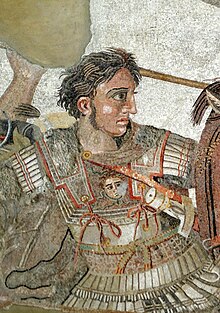Alexander III of Macedon (Greek: Αλέξανδρος, Aléxandros; 20/21 July 356 BC – 10/11 June 323 BC), commonly known as Alexander the Great, was a king of the ancient Greek kingdom of Macedon.[a] A member of the Argead dynasty, he was born in Pella—a city in Ancient Greece—in 356 BC. He succeeded his father King Philip II to the throne at the age of 20, and spent most of his ruling years conducting a lengthy military campaign throughout Western Asia and Northeastern Africa. By the age of thirty, he had created one of the largest empires in history, stretching from Greece to northwestern India.[1][2] He was undefeated in battle and is widely considered one of history's most successful military commanders.[3]

During his youth, Alexander was tutored by Aristotle until the age of 16. His father Philip was assassinated in 336 BC at his sister's wedding, and Alexander assumed the throne to the Kingdom of Macedon. After sacking the city of Thebes, Alexander was awarded the generalship of Greece. He used his authority to launch his father's pan-Hellenic project, which involved him assuming the leadership position to all the Greeks in their conquest of Persia.[4][5]
In 334 BC he invaded the Achaemenid Empire (Persian Empire) and began a series of campaigns that lasted 10 years. Following his conquest of Asia Minor (modern-day Turkey), Alexander broke the power of Persia in a series of decisive battles, including those at Issus and Gaugamela. He subsequently overthrew King Darius III and conquered the Achaemenid Empire in its entirety.[b] At that point, his empire stretched from the Adriatic Sea to the Beas River. Alexander endeavored to reach the "ends of the world and the Great Outer Sea" and invaded India in 326 BC, achieving an important victory over King Porus at the Battle of the Hydaspes. He eventually turned back at the demand of his homesick troops, dying in Babylon in 323 BC; the city he planned to establish as his capital. He did not manage to execute a series of planned campaigns that would have begun with an invasion of Arabia. In the years following his death, a series of civil wars tore his empire apart.
Alexander's legacy includes the cultural diffusion and syncretism which his conquests engendered, such as Greco-Buddhism. He founded some twenty cities that bore his name, most notably Alexandria in Egypt. Alexander's settlement of Greek colonists and the resulting spread of Greek culture resulted in a new Hellenistic civilization, aspects of which were still evident in the traditions of the Byzantine Empire in the mid-15th century AD and the presence of Greek speakers in central and far eastern Anatolia until the Greek genocide and the population exchange in the 1920s. Alexander became legendary as a classical hero in the mould of Achilles, featuring prominently in the history and mythic traditions of both Greek and non-Greek cultures. His military achievements and enduring, unprecedented success in battle make him the measure with which many modern military leaders compare themselves.[c] Military academies throughout the world still teach his tactics.[6] He is often ranked among the most influential people in human history.[7][8]


0 Comments
If u have any doubts. Leave your comments here.. Thank U